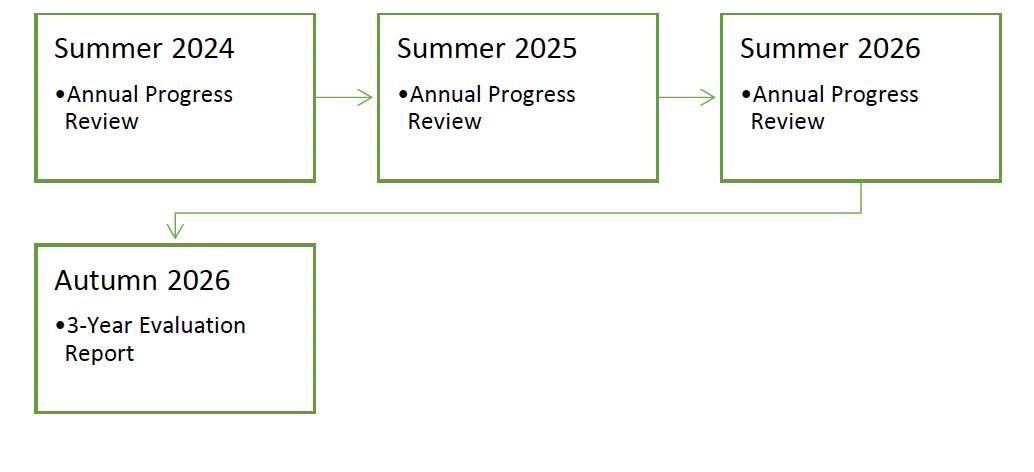Cancer strategy 2023-2033 and cancer action plan 2023-2026: monitoring and evaluation framework - August 2023
This outlines our intent to monitor and evaluate the Cancer Strategy for Scotland 2023-2033 and Cancer Action Plan 2023-2026. It sets out a strategic, evidence-based and outcomes-focused approach to assess progress towards the vision of improved survival and excellent, equitably accessible care.
5. Monitoring and Reporting Progress
5.1 Monitoring of activity and reporting of evaluation evidence
How will we report on progress across the period of the first action plan?
As indicated at the beginning of this Framework, a key purpose of evaluation is for accountability (see Section 2.1). Regular monitoring will be undertaken by the Cancer Policy Team in the Scottish Government and reported to the Scottish Cancer Strategic Board as 'owners' of the Cancer Strategy and associated Action Plans. An annual update on progress will summarise key developments. This policy publication will include an analyst-led section that will provide an update on available published evaluation findings (interim and final), progress relating to key headline indicators (see Section 4.2) and relevant data developments at the time of reporting. This approach will enable us to feed interim evidence into the policy cycle to determine what, if any, actions need to be adapted.
An evaluation report will be published at the end of the first Cancer Action Plan. The evaluation report will document progress towards the strategic ambitions and any early evidence that provides any indication of the overall impact of the Cancer Strategy (see Section 4.1). This will include a synthesis of published data and evaluation findings to assess progress towards the outcomes and vision of the strategy. This timepoint will allow us to assess any measurable change in relation to short-term outcomes once the first Cancer Action Plan is complete (see Section 3.2), and to report on trends in headline indicators (see Section 4.2). The overarching theory of change (see Section 2.2) will be updated, if necessary, using the available data and evidence. The report will articulate any new evaluation criteria, data gaps or considerations for new approaches to support the evaluation of actions in the second Cancer Action Plan and overall impact of the Cancer Strategy in the following years.
The planning for further updates and reports beyond the timeline of the first Cancer Action Plan will be communicated in the evaluation report, with the intention to produce a further three-year evaluation report in 2029, and a final evaluation report that synthesises evidence and provides a digest of key learning across the timeline of the strategy as of 2033. As data builds, conducting an evidence synthesis will enable us to consider how policy actions have contributed to impact. A summary of planned outputs during the first Cancer Action Plan 2023-2026 is provided in Figure 2. Further outputs will be specified in future updates.

5.2 Knowledge Exchange and Learning
How will we share learning from monitoring and evaluation activities?
As indicated in Section 2.1, learning is a key purpose of the evaluation of this strategy. As articulated in the Cancer Action Plan 2023-2026, we will apply Healthcare Improvement Scotland's concept of learning systems to understand progress and share learning. This approach supports a commitment to capture and share good quality evidence-based learning as it emerges across Scotland. It will be important to consider what variation tells us about the system, specifically what is working and not working, and to share this learning across the system. And it will be important to understand local priorities for evaluation, learning and evidence needs.
Specific mechanisms for supporting Learning Systems will be developed with stakeholders. This will ensure an ongoing interface to strengthen connections between national policy and local service delivery given their interdependency in realising the ambitions and vision set out in the Cancer Strategy. This may take the form of sharing learning from local approaches and examples of 'what works', in addition to sharing national level evidence to support good practice.
Contact
Email: socialresearch@gov.scot
There is a problem
Thanks for your feedback